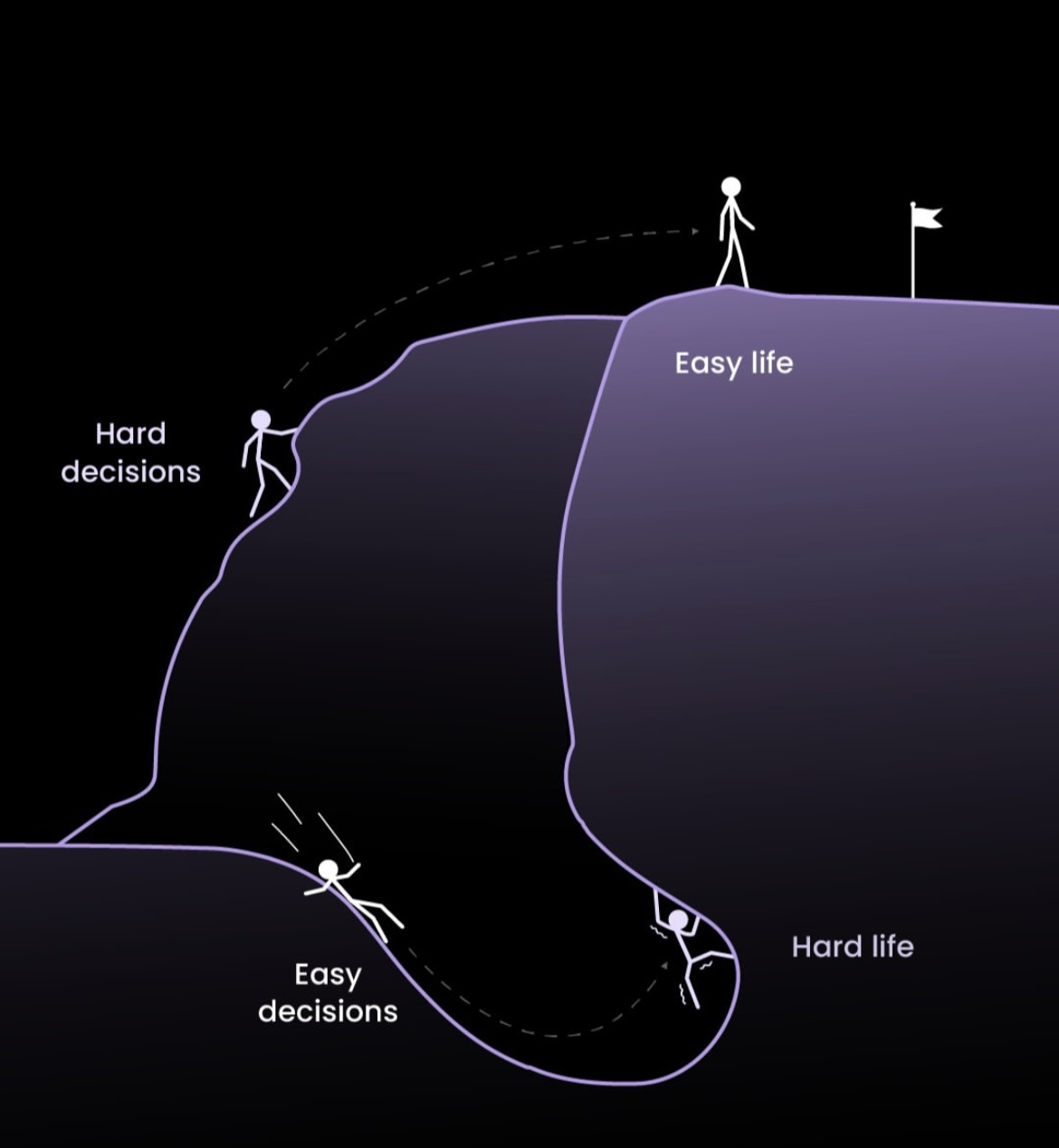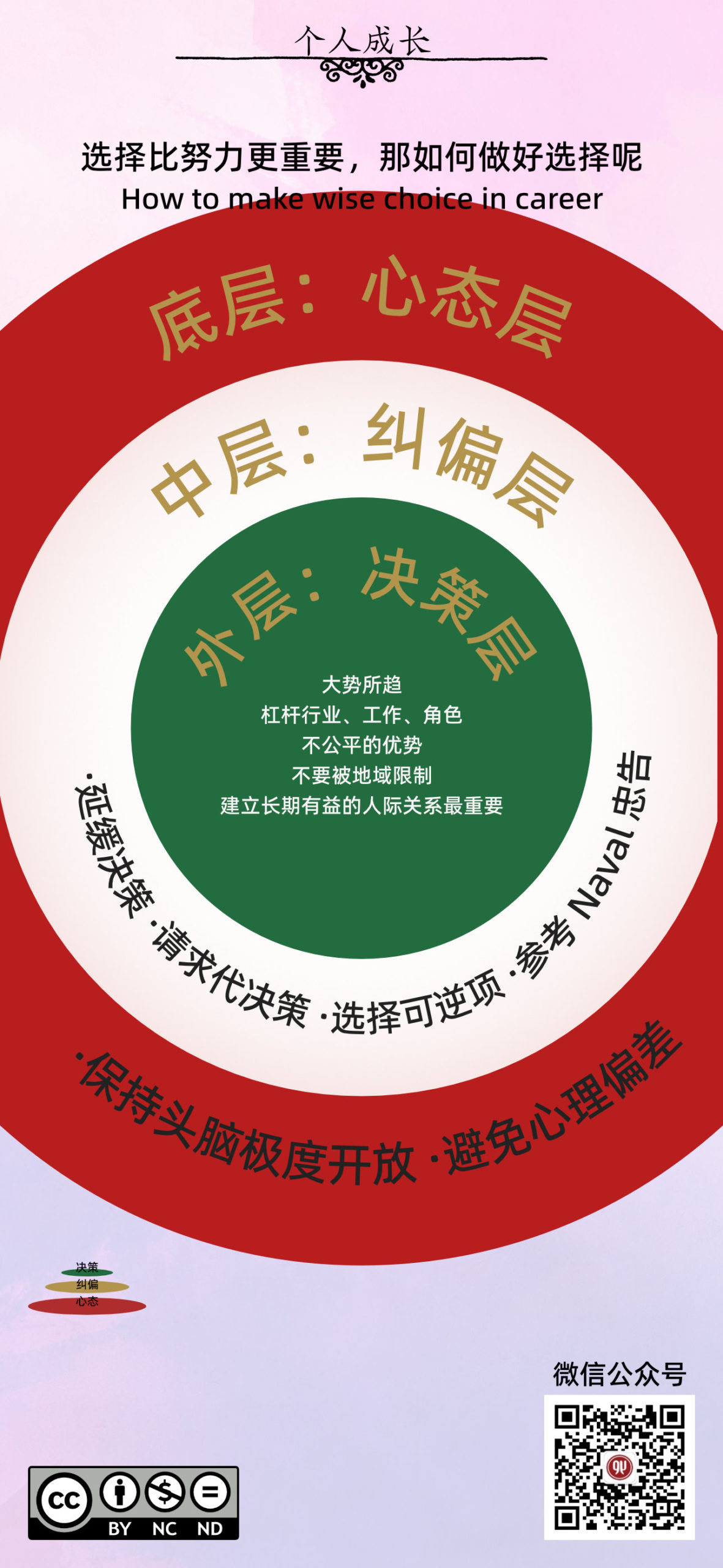We often hear a saying that “choice is more important than effort”. In fact, a person’s quality of life often depends on the quality of a few important decisions made, so choice and decision-making are crucial for everyone. Recently, I made a career choice and when I realized that this choice would “narrow the road ahead”, although I don’t regret it, I felt very painful and began to reflect. Because I believe that pain + reflection = progress. During the process of reflection, I read a lot of books and had high-quality one-on-one conversations with many outstanding individuals to seek their feedback. I would like to share this reflection process with you.
If it can help you improve the quality of your decision-making and avoid panic and helplessness when making decisions in the future, I believe this content is very valuable.
First of all, my point of view is not that exerting effort is not important. Effort is an extremely important ability and quality, and in this era, it is also the basic skill of many outstanding individuals.
However, our efforts must be based on the correct path and direction in order to better reflect its value. At the same time, I am not teaching you to “get rich quick”, because I believe that if you have a choice, it means that you have crossed the necessary threshold.
In a career, everyone may face many important moments that require making choices. If you are really in this situation, congratulations, because having a choice is always better than having no choice. Those who have a choice are happy and capable.
When making a choice, some people believe in intuition, some people believe in fate, and some people use a table to score and compare, or adopt other decision-making methods.
In fact, a person’s quality of life usually depends on the quality of decisions they make. “Men fear choosing the wrong profession, women fear marrying the wrong man,” describes the importance of choice. Think back to who you chose to marry, which stock you held, where you went to school and settled down – every choice has affected your life today.
Combining my personal experiences of success and failure, as well as the decision-making methods I have observed and interviewed successful people from all walks of life, what experiences and reflections have I gained?

Does your choice fit the “trend”?
The so-called trend is a way of thinking about problems from macro to micro. Trends generally appear in industries where the “new world occupies the old world,” such as the penetration of electric cars into the oil car industry. They also appear in industries where the industry structure undergoes intergenerational change due to major breakthroughs, such as the recent impact of LLM on various industries. They also occur in industries where the supply-demand relationship undergoes dramatic changes, such as batteries and chips, making these industries suddenly more important.
A very experienced technical leader I knew once gave his opinion at the end of 2022: the recent trends are going global, new energy vehicles, and chips. Of course, he is currently working in one of these areas.
These trends often create industries that you need to pay attention to and make decisions about, and it’s best to join in before the trend peaks. If you have a choice, reduce the weight of options in the “mid-to-late stage” of the industry cycle.
At the same time, some trends are “fake” trends, and you must be good at distinguishing them. I won’t express my opinion on this, but OpenAI founder Altman believes that Web3 is a fake trend.
In a one-on-one conversation, a well-known foreign company’s CEO (now retired early) gave me some guidance. He advised me to learn more about the nature of the industries of each option, whether “you are asking others for help or others are asking you for help.”
This sentence opened my eyes. We all know that industries have upstream and downstream, and generally, the people who pay you are your customers, that is, the downstream of the industry.
If they are eager to buy your products or services, then congratulations, you are in a trend, a bit like a seller’s market in economics.
If your relationship is mutually beneficial, then congratulations, at least you are in a very good place for value exchange.
However, if your relationship is always that you are asking others, and it is still difficult for others to make a decision to buy your products or services, then you need to ask yourself whether the trend has not arrived (then do you understand the conditions for the trend to arrive?), or whether this is not a trend industry.
You may ask, how is it possible that there are such good things in the world, and how can I be involved in them?
It all depends on your judgment of the trend and your early action, such as when foreign companies first entered the Chinese market, or when you are currently working in a large language model team. But all of this depends on whether you established yourself before the trend arrived.
If you pay your upstream, that is, your supplier, but still have to beg them every day, then quickly stay away from those industries, or study your supplier’s business, which may be the trend.
The trend is not easy to predict. It is often created by various factors such as era, region, industry, technological breakthroughs, and capital. If you can maintain sensitivity to the market, not only focus on your work but also look up, I wish you can discover the real trend and enter those fields earlier than others.
Find leveraged industries, jobs, and roles; make full use of leverage in work
What is leverage?
Leverage means that you can achieve relatively large output with relatively small effort. I give many examples to deepen everyone’s understanding:
Product is leverage, because the product features you spend a lot of time making may be used by thousands of users. The number of users and usage time brought by good products is the leverage of product managers.
Management is leverage, because if every unit of time you invest in management can be well digested and absorbed by subordinates, better supported by horizontal teams, the organization you are responsible for can bring greater output than you can achieve alone. Leadership and organizational effectiveness are the leverage of managers.
1-to-N communication is leverage, because one time investment may bring more listeners (or already in a situation with many listeners). If these listeners can truly feel your content, then your time investment return is more worthwhile. Good content and 1-to-N communication methods are the leverage of content outputters. Coffee break or town hall meeting is how executives use communication leverage.
High-quality 1-on-1 communication can also be leverage, because a deep 1-on-1 conversation can let you and the conversation partner know each other more deeply, based on understanding and trust, and can more likely promote your cooperation in the future. High-quality conversation is the leverage of conversation partners.
Tools can also be leverage. Jobs once said: “Personal computers were ‘bicycles for the mind’.” Why?
Jobs cited an article from Scientific American in 1973. If you study the efficiency of various animal movements, you will find that eagles are the most efficient, and humans rank very low on the list, until humans use bicycles, which can easily surpass all species in terms of mobility efficiency.
Bicycles are the leverage that allows humans to easily surpass all species in mobility efficiency.

I have given too many examples above, and these “leverages” are specific examples of fully decoupling input and output relationships.
Returning to the choice of a career, what are leveraged industries, jobs, or roles?
Choose industries that are leveraged as much as possible. They often reflect higher degrees of productization, scale, industrialization, and replicability of business. Take the advertising industry I am familiar with as an example. Advertising on User-based platforms operates on a leveraged model, while Campaign-based advertising does not. The model that serves small and medium-sized enterprises is preferred over the one that only services a few large clients. Additionally, these industries may exhibit high concentration and have strong network effects.
Engage in leveraged work or roles as much as possible. These jobs can decouple your output and contribution from the time you invest. If possible, try to be in a management position, because management is leverage.
If you are a frontline worker, try to choose roles such as product, research and development, operations, marketing, etc. that allow you to communicate with multiple people at the same time (usually with customers).
If you have a choice, try not to do roles such as performance-based sales, marketing personnel who cannot scale to reach users, and operations personnel who rely on stacking people, unless you are in an industry where time-based fees are very, very high, such as a law firm partner.These low-leverage roles keep you busy every day, but the return is only proportional to your investment.
It should be noted that these jobs and roles require higher personal abilities, such as sufficient leadership as a prerequisite for management leverage, so at this step, you must ensure that you have the corresponding personal ability.
Be sure to understand the details of the job and whether it can provide leverage, and how much leverage it can provide. If not, say no.
Fully use leverage in your work
This content is not related to how to make career choices, but it is very important for personal development. I look forward to sharing it with you in the future. In summary, standardized replication may be a more powerful weapon than hard work.
Find your Unfair Advantage and use it in work where it can be demonstrated.
What is an Unfair Advantage?
It’s something that you can do easily that others find difficult, or an experience advantage that you have over others.
Successful people may not realize or admit it (most successful people won’t), but once they reach a certain level of ability, they often use their Unfair Advantage to easily beat their competitors. This is not a theory I invented, but rather a viewpoint expressed in “Outliers” and other works: success is a combination of many factors, and a significant portion comes from Unfair Advantages, which may include experience, ability, personal traits, and even random events. These advantages can have varied impact based on the choice of the “battlefield.”
You might ask for an example of an Unfair Advantage.
Experience Advantage x Industry Choice: Bill Gates, for example, has an unparalleled advantage in computer programming experience. In 1968, while still in 8th grade at Lakeside School, he was able to learn computer programming on a time-sharing system thanks to the school’s unique resources. In the 7 months of 1971, Gates and his colleagues spent a total of 1575 hours in the mainframe room of ISI. He claims that at the time, there were probably no more than 50 people in the world with his level of computer programming experience. These magical experiences gave him an unfair advantage, which was one of the reasons for his success.
Language Advantage x Foreign Companies: If you speak English very well and have native speaker-level proficiency, you will have some advantages in any foreign company, but this advantage won’t create any unfair advantages in the company’s headquarters. However, when you work in a Chinese office, being a native speaker would be an unfair advantage. You will have more opportunities to communicate directly with the foreign company’s headquarters, and you will most likely be given more “reporting work” (sometimes even reporting the work of others).
Geographical Advantage x Foreign Companies: If you are from Hong Kong or Singapore, these two places are likely to be the headquarters of foreign companies in the Asia-Pacific region. If you work there, you automatically gain an Unfair Advantage. You will have a greater chance of getting a high position and leading teams from other surrounding countries, even if those employees are more capable than you.
In summary, once you have some advantages and use them on a battlefield where they can be demonstrated, you can reap huge rewards – you can win more easily.
The most interesting thing about Unfair Advantages is that these easy victories constantly create positive feedback, constantly self-reinforcing your confidence and work performance, making you stand out.
I have a schoolmate who interned at Microsoft and is now a KA salesperson at a globally renowned cloud service company. The sales of cloud services are not only about making deals, but also about maintaining customer loyalty and generating more service consumption. Therefore, service experience is crucial. He has a few Unfair Advantages – he is not stage fright, can host shows, and has a natural sense of humor. He uses these advantages to even host activities and programs organized by the customer’s HR department as a cloud service provider, and finds ways to embed the service brand into the customer, thereby firmly holding the customer’s hand.
Have you ever thought that you have already won even before the competition begins, and the more you win, the more you will win?
Find your Unfair Advantage and use it on a battlefield where it can be demonstrated.
Don’t be limited by the location of opportunities – heroes need to embark on a journey
Sometimes opportunities arise, but they are not in the city or even the country you are familiar with. What should you do?
I have a friend in the advertising technology industry who is from Hubei, started his journey from Hubei, studied in Beijing, and now works in Shenzhen with a Shanghai household registration. My former boss went from Shanghai to Europe to the United States and then to Beijing. In the past 2-3 years, I have also moved my workplace from Shanghai to Haidian District in Beijing (now I have moved back). The year when I paid the most taxes in my life was the year I paid to the Haidian Taxation Bureau.
Such examples are everywhere around me. I may be more familiar with Haidian District. In 2022, Haidian District’s GDP will exceed one trillion yuan, making it the only district in China with a GDP exceeding one trillion yuan. This district is known for its Internet companies and Haidian mothers. If you have the opportunity to work in an Internet company in Haidian District and pay taxes, and your child is still studying in this district, then you and your child are already ahead of most peers in China in terms of income and education quality.
Because you have chosen the right place.
A few days ago, I met two outstanding young people from Baidu’s US R&D center who came to Shenzhen for business. They both have good backgrounds and have been looking for opportunities in Singapore or China because, for them, the battlefield where they can best demonstrate their unfair advantages (language advantages compared to Chinese people and knowledge advantages of the Chinese market compared to Americans) is here.
Opportunities are where people move, especially high-end opportunities.
Eileen Gu is a Chinese person in China, an American person in the United States, and a similar mechanism.
You may ask, what about the elderly and children if you move? For this problem, everyone has their own objective conditions and methods, but from my observation and relocation experience, most people overestimate the difficulties they will encounter; second, working in two places but living separately can still lead to a happy family life, and outstanding people who relocate with their families are everywhere.
This depends on what is most important in your values, whether you have communicated with your family clearly, designed a suitable “mode” for family operations, and whether the return brought by new opportunities is large enough to cover these costs.
Don’t be limited by the location of opportunities, focus more on the opportunities themselves. As with the hero’s trajectory presented in “The Hero with a Thousand Faces”, heroes start their journey because of some call and eventually return to their place of departure. I wish you could pack your bags by your call and embark on the journey of becoming a hero.
Establishing long-term meaningful relationships is often more important than all of the above principles
The importance of long-term meaningful relationships for career development increases with the length of time spent working. For example, having a mentor is important. First, let me explain what a mentor is; this is not promoting utilitarianism.
People like Zhou Shouzi, who have impeccable resumes, are extremely rare (everyone may like him and want to get close to him), but actually, each of us has our own traits, and not everyone will appreciate your traits.
Therefore, once you find someone who appreciates your traits, you must cherish them.
When a leader appreciates your traits and your traits happen to help him succeed, he gives you an opportunity, and this situation where you can achieve mutual success can be considered as having a mentor.
However, finding such a mentor is not a high probability event.
Think back to your career development process. How many mentors have you had who “appreciated your traits and gave you opportunities”? In what situations did they appear?
If I have one major reflection on my unwise choices this time, it is: “If there is such a mentor who appreciates me and gives me an opportunity, I will firmly choose this long-term beneficial relationship, work with him, and say no to other options.”
Other methods and models:
- Find a suitable development direction for yourself from the intersection of “what the organization needs, what you are capable of, and what you are interested in.” This is a simplified version of Ikigai – from the advice of my former boss.
- Charlie Munger’s advice (from “Poor Charlie’s Almanack”): What young people should pursue in their work:
- Don’t sell what you wouldn’t buy.
- Don’t work for people you don’t respect or admire.
- Only work with people you like.
- Pre-write your resume on LinkedIn (write your new job in your resume, but don’t forget not to click the publish button), similar to Amazon’s “working backwards” method, to see which one is more pleasing?
Scope of application
- This content is suitable for people like me who do not have a privileged background and exceptional intelligence, as the value of each choice is more important.
- It is suitable for people who want to take their career to the next level.

Feedback I received and principles I summarized:
Those who are more excellent than me, gave me these valuable feedback:
- So what are you aiming for with this choice? (When he understood that my current job is of great value and difficulty but there is not much incentivizing income) | From the CEO of a well-known foreign company
- Grit | You are leaving when you face this difficulty just after joining, I find that you lack Grit | From my former boss
- Vision | When you make decisions, it’s like taking a snapshot, rather than looking at things with a developmental perspective | From my former boss
- Continuity of work | I noticed that your recent work experience is not long enough, which may be a disadvantage | From one of my most respected technical leaders
Principles I have summarized:
How to choose and judge:
- Does your choice fit the “trend”?
- Find industries, jobs, and roles with leverage; use leverage fully in your work
- Find your Unfair Advantage and use it in work that can reflect its unfairness
- Don’t be limited by the location of opportunities – heroes need to set out
- Establishing long-term meaningful relationships is often more important than all of the above principles because this is an extremely valuable low probability event
If you still can’t make a choice and are still struggling, then:
- Slow down the decision-making process
- Find more people who are better than you to help you make choices and ask them to tell you why they made their choices
- If all else fails, choose a reversible option (if you choose B, you cannot choose A, but after choosing A, you can still choose B, so don’t choose B for now)
- Think carefully about these words from Naval:
- If you can’t decide, the answer is no.
- If two equally difficult paths, choose the one more painful in the short term (pain avoidance is creating an illusion of equality).
- Choose the path that leaves you more equanimous in the long term.

Throughout this process, always remind yourself:
- Keep an extremely open mind. I am “stubborn” and my mind is not open enough. I have not fully accepted the views of people who are more capable and have higher levels than me, and the people I consult are also limited.
- Avoid psychological biases. Don’t first insert a choice and then look for evidence to strengthen the correctness of that option.
I share this reflection process with everyone. If it can help you improve the quality of your decision-making in the future, avoid panic and helplessness when making decisions, then I believe this content is very valuable.
Wishing you to stay calm and steadily grow with every career choice you make in the future.



